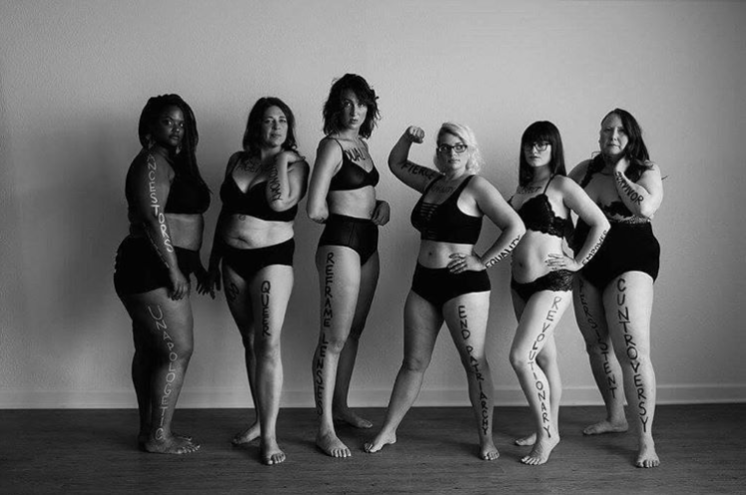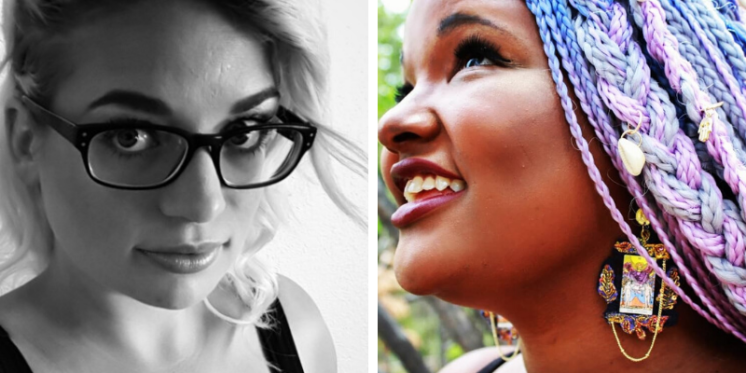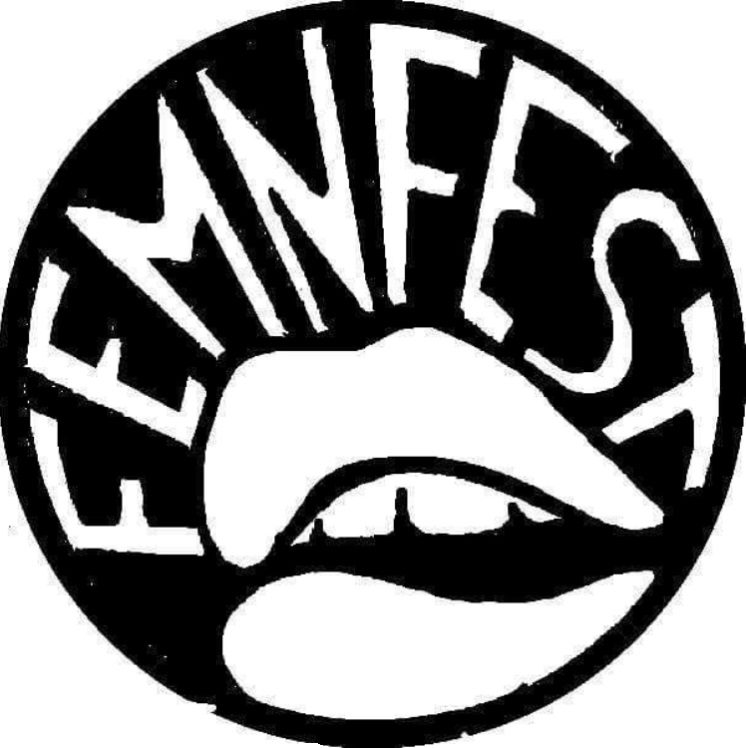FeMN Fest scaling down before ramping up

Last year’s FeMN Fest organization team was made up of Diona Johnson, Jesse Dykhuis, Abigail Mlinar, Brittany Lind, McKenzie Howe and Melissa La Tour. Photo by Jes at Mad Chicken Studio.
Since 2017 “a team of womxn-identified bosses” have brought “an unapologetically feminist festival” to Duluth. In its first two years FeMN Fest featured womxn-lead music, art, workshops and vendors. The third annual event on Friday, Nov. 15, at Pizza Lucé is a scaled-down version featuring three musical acts: Me-N-Her, One Less Guest and Wild Flower.
With a mission to amplify underrepresented voices, FeMN Fest’s intersectional space has been one of comfort and safety for those involved.
“What I’ve loved most about the festival is the atmosphere,” said volunteer Jamie Ratliff, an art historian and co-director at Prøve Gallery who got involved with previous FeMN Fests as a member of the Feminist Action Collective. “It was so comfortable and meaningful knowing that this space was being carved out to celebrate people that are usually marginalized or ignored in festivals, music venues or just in life.”

The 2019 FeMN Fest co-producers are Brittany Lind and Diona Johnson. (Diona Johnson photo by Shelby Joy)
Since the womxn running the event have synced their “success cycles,” either moving from the area or gravitating toward other projects and passions, the festival also needs to be scaled down to match the time available to remaining co-producers Diona Johnson and Brittany Lind. The dynamic duo have been a part of cultivating the event since its start in 2017, when Melissa LaTour, Abigail Mlinar and McKenzie Howe were also part of the organization team. Jesse Dykhuis joined them in putting together the 2018 festival.
While this year’s feminist celebration is aimed at having a good time, contributing funds and recruiting new members to next year’s organizational team, the passionate intention to include as many voices as possible and spotlight women in business has not changed.
The evening includes a “female-focused tap takeover” with breweries and beers crafted by women, including taps by Urban Growler of St. Paul, the first women-owned microbrewery in Minnesota. Female-brewed Earth Rider beers are also included. In addition, all of this year’s performing musical artists are new to the festival in an effort to showcase fresh femme faces.
Connected to the Mission
Marcelle Jordan of the Minneapolis-based band Wild Flower, who identifies as non-binary, has felt frustrated about “being treated like a woman in the music scene.” The singer, songwriter and rhythm guitarist got involved with the festival after discussing frustrations within the music scene with Johnson. “People treat you like you couldn’t possibly be as talented as they are because you’re not a man,” said Jordan, who feels unrecognized for the songwriting that goes into the band’s music.
Wild Flower’s indie-rock, alt-rock and folk music has been influenced by stories and moments dealing with diverse identities and experiences of gender dysmorphia. One of the main purposes of the band’s music is “liberating the means of connection” and “creating experiences that are anti-capitalist to connect people” as a “means of survival and a radical reclamation.” It’s “one of the things that I can do to usher in the revolution,” Jordan said.
Duluth is where Jordan saw a live show for the first time and looks forward to returning to perform in what will feel like a “homecoming” in a city with “such a big music scene” but also “so much social capital and disparity.”
One of the best parts of working with the individuals cultivating the environment at FeMN Fest as either a musician, vendor or workshop facilitator is that everyone has been “excited and passionate about what they [bring] to the festival,” Johnson said. In past years Johnson organized workshops; this year she performs with Me-N-Her. She expressed that rather than being focused on what they can book or sell, contributors instead are “connected to the mission and the values of the festival.”
After attending the first year as a vendor selling T-shirts and sharing her portfolio, tattoo artist Jillian Dollars was moved to get more involved the following year by holding a workshop. Centering conversations around women in visual arts, she focused on mediums that are not “what would be considered classical visual arts,” “outside of the norm” or not in the “upper echelons of what we consider fine arts.”
A workshop focused on women in art allowed Dollars and the other female artists to have conversations about challenges they face in their fields, such as getting paid and asking for what they’re worth. “I work in a male-dominated field. And I have for many years, so I definitely have some background where that is concerned,” she said.
Tattooing for more than 14 years, Dollars expressed that the sexism found in the field had been much worse when she started, but “it’s still pretty bad,” with little experiences that add up. People are “surprised that you are the person doing the tattoo,” even after spending a substantial amount of time together doing paperwork and planning the tattoo design, she said. While Dollars mentioned that they bother her less often now after having years of practice, she said these moments, common in many other male-dominated fields can “still be discouraging.”
“Sometimes people don’t want to hear it or don’t want to see it,” Dollars continued, but it happens a lot and “is not my imagination.” For instance, when some clients enter the tattoo studio they “almost want you to prove to them that you could possibly wrap your mind around” the design they want to get, or “say ‘oh, you’re actually good.’”
Other workshop topics that have been included in previous years include embodied consent, yoga, parenting in the non-binary, sex positivity, sex toys, assorted panel discussions about business and art, and burlesque 101. In essence, “anything that pertains to art, pleasure, fairness, access and equality” that can be tied into feminism, Johnson said.
Cultivating a Creative, Collaborative Crew Focused on Intersectional Access
Next year, Lind and Johnson want to see the festival return to a larger platform packed with workshops, bands and vendors, which means this year they hope to recruit people for the various roles previously held by their missing original organizers. “It became very evident that we didn’t have time to fully throw ourselves into it like we had the last two years,” said Lind speaking to the size of this year’s event.
“Because we’re all such a bunch of badass women, we obviously have other projects that we have going on,” said Johnson, who has recently ramped up her musical endeavors and has been performing more frequently.
A festival the size of the past two years requires many skill sets and roles including people to complete graphic design, social media, band booking, obtain required permits, speak with related community members and write grants.
While filling in old shoes, Lind expressed the need for finding a team member who is more familiar with writing grants than they had in previous years in order to combat the challenge of accessibility.
“We need to keep ticket prices reasonable, while also understanding that women’s work is often viewed as being less worthy of money than men’s work.” Since all of the musicians and workshop facilitators were paid for their contributions, the ticket prices reflected that part of the budget and made it difficult for as many people to attend as possible.
“Many times as women, you’re pressured or expected to accept whatever people might give to you,” Johnson said. She described that an interest or love for the type of art that women are creating is one of the ways in which women are exploited for their work. “People are more inclined to emotionally manipulate or have us engage in additional labor outside of what we are being paid for,” such as asking for less money than it takes to produce the art they are creating.
“It would be nice to actually pay people what they ask for instead of having to be restricted by finances,” said Johnson, aware of the emotional and physical labor that goes into holding the workshops after contributing one about ethical non-monogamy last year. Asking people to commit to a weekend and contributing their work “takes hours of preparation and hours of planning and resources for printing things.”
Last year Blackbird Revolt, a Duluth social justice-based marketing studio, offered scholarships for women and non-binary people of color, a demographic that previously had less access to the festival. Organizers are hoping to find additional ways to continue to make FeMN Fest as accessible and intersectional as possible.
“We have been trying to reach out to people and run things by them,” Lind said. “We had a situation our first year where one of our performers was in a wheelchair and it never occurred to us that Sacred Heart didn’t have a ramp because Gaelynn Lea plays there all the time.” In order to increase access to those in wheelchairs, a custom ramp was built for Sacred Heart that remains there for anyone who needs to get on stage.
Watching the festival take shape and all of the pieces fit together has been overwhelmingly rewarding for the organizers and the emotions brought to the event took them by surprise. Shifting between managing three different stages, “there were moments I would set down my drink and I’d go do something else,” said Lind. “And the concept that I could just abandon my drink and not have to worry was something I’d never experienced before.”
The overall safety and support in the environment led participants to tears in both years. “It was interesting to see how many people cried, but in a good way,” Lind said. While she acknowledged this year’s scaled-down event will likely have a different emotional affect, she looks “to keep the name alive” this year as the organizers engage with new powerful women excited about continuing their intersectional work.
Leave a Comment
Only registered members can post a comment , Login / Register Here











No Comments